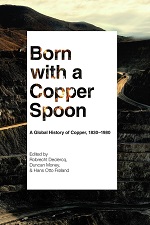Born with a Copper Spoon - A Global History of Copper, 1830–1980
 Born with a Copper Spoon examines how the metal has been produced, distributed, controlled, and sold around the globe. Over the past two centuries, industrial societies hungry for the highly conductive, corrosion-resistant metal – essential for light, power, and communication – have demanded ever-increasing quantities of copper. From copper cartels and the futures market to the consequences of resource nationalism, Born with a Copper Spoon has a global scope. However, this is not simply a narrative of ever-increasing and deepening global connections. It is also about periods of deglobalisation, fragmentation, and attempts to sever connections, as was the case in the mid-twentieth century, when a bitter contest over ownership of mineral resources briefly threatened to cause a major realignment of the world economy. Throughout history, copper production has spawned its own practices, technologies, and a constantly changing political economy. Large-scale production has affected ecologies, states, and companies, while creating and even destroying local communities dependent on volatile commodity markets. The first president of Zambia, Kenneth Kaunda, once remarked that Zambians were “born with a copper spoon in our mouths,” but few societies managed to profit from copper’s abundance. Contributors to this far-reaching collection cover the finance, technology, labour, business, politics, and environmental impact of one of the world’s most important metals.
Born with a Copper Spoon examines how the metal has been produced, distributed, controlled, and sold around the globe. Over the past two centuries, industrial societies hungry for the highly conductive, corrosion-resistant metal – essential for light, power, and communication – have demanded ever-increasing quantities of copper. From copper cartels and the futures market to the consequences of resource nationalism, Born with a Copper Spoon has a global scope. However, this is not simply a narrative of ever-increasing and deepening global connections. It is also about periods of deglobalisation, fragmentation, and attempts to sever connections, as was the case in the mid-twentieth century, when a bitter contest over ownership of mineral resources briefly threatened to cause a major realignment of the world economy. Throughout history, copper production has spawned its own practices, technologies, and a constantly changing political economy. Large-scale production has affected ecologies, states, and companies, while creating and even destroying local communities dependent on volatile commodity markets. The first president of Zambia, Kenneth Kaunda, once remarked that Zambians were “born with a copper spoon in our mouths,” but few societies managed to profit from copper’s abundance. Contributors to this far-reaching collection cover the finance, technology, labour, business, politics, and environmental impact of one of the world’s most important metals.
Author(s) / editor(s)
About the author(s) / editor(s)
Duncan Money is a historian of Central and Southern Africa during the 19th and 20th century. His research focuses primarily on the mining industry and, in particular, the Zambian Copperbelt. Duncan’s main interests are in labour, race and global history, specifically the ways in which the mining industry connected seemingly disparate and distant places across the globe and the consequences that emanated from this. Alongside his research, Duncan Money manages a project to preserve and digitize the archives of the Mineworkers’ Union of Zambia.

